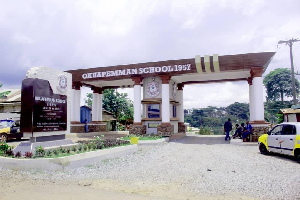- Home - News
- TWI News | TV
- Polls
- Year In Review
- News Archive
- Crime & Punishment
- Politics
- Regional
- Editorial
- Health
- Ghanaians Abroad
- Tabloid
- Africa
- Religion
- Election 2020
- Coronavirus
- News Videos | TV
- Photo Archives
- News Headlines
- Press Release
General News of Monday, 12 March 2001
Source: Ghanaian Chronicle
Top Lawyer Cautions Government On HIPC
An eminent Ghanaian lawyer and social commentator, Akoto Ampaw has warned that the New Patriotic Party's (NPP's) economic policies would be a failure just as its predecessor, the National Democratic Congress (NDC) if it accepts to join the Highly Indebted Poor Countries (HIPC) initiative.
He said if government "seeks to tackle the socio-economic problems of this country from the root and move us forward as a proud and able people, then it ought to reject HIPC without a second thought". Lawyer Akoto Ampaw was speaking at a stakeholders' forum on HIPC held in Accra as the representative of the Jubilee 2000 Africampaign, Ghana chapter.
He said if government intends to pursue the flawed Structural Adjustment Programme (SAP) and simply survive as a government without any great ambitions of moving this country forward, then clearly, it has something to gain in joining HIPC, and warned that rejecting HIPC while pursuing structural adjustment would be "to cut one's nose to spite one's face". Lawyer Ampaw, known for his radical condemnation of issues, however, admitted that should the Kufuor government be bold and visionary enough to take the path of struggle by shunning the HIPC initiative, then "Ghanaians ought to know that there will be some tough and difficult days ahead".
Continuing with strain of seriousness and anger clearly showing on his face, he said the HIPC initiative is not aimed at resolving nor can it resolve the fundamental problems posed by Ghana's external debt crisis and requested Ghanaians, especially the middle class, to stand up to the demands of the struggle. He said what the initiative seeks to do is to postpone Ghana's problems into the future while reducing the debt service burden to levels arbitrarily determined by the IMF as sustainable.
"The essential point is that joining HIPC means a rigid commitment to structural adjustment and its harsh conditionalities, which from experience, have proved futile," Lawyer Ampaw, the prison veteran intimated. The stance of Lawyer Ampaw was, however, not supported by Professor Cletus Dordunoo, Executive Director of the Centre for Institutional Development and Economic Management and Mr. Kofi Brapui Asante, a former Diplomat and civil society commentator who held that HIPC was good for Ghana.
Professor Dordunoo held that HIPC initiative aims at helping the highly indebted poor countries to reduce their debt to sustainable levels as a way of renewing their prospects for growth and to free up resources for vital social needs. He said should Ghana join HIPC, she would benefit from between $600 million and $800 million debt relief over the first three-year period while sustaining her external debts in the near future. He said Ghana is indeed qualified to join HIPC but it behoves government to understand the concept thoroughly before arriving at a final decision.
On suggestions by Britain and Japan and their subsequent threats, the learned professor said "Britain and Japan don't matter now, what matters is for Ghana to understand the issue and take a decision". He condemned the notion that Ghana is not poor, stressing that the country is "resource rich" but economically poor so joining HIPC won't impact on the country's credibility. Professor Dordunoo who until recently headed the Ghana Institute of Management and Public Administration (GIMPA) delved extensively on statistics to show that Ghana is indeed poor.
MR. Kwamena Essilfie Adjaye, an economic consultant and advisor to government was undecided on whether Ghana should join HIPC or not. He said should Ghana join HIPC, her total debt service to revenue ratio would decrease from 21% to 9% or 8% from 2001 to 2003. He said debt relief benefits that the country will get would enable it achieve faster growth by channelling funds to be used for servicing debts for growth and development.
On the contrary, he said it is uncertain whether debt relief will materialise with HIPC because this would be determined through negotiations. Mr. Essilfie Adjaye also warned on the possibility of Ghana becoming less attractive to foreign direct investment should she join HIPC.










